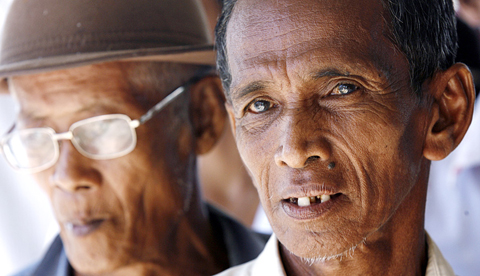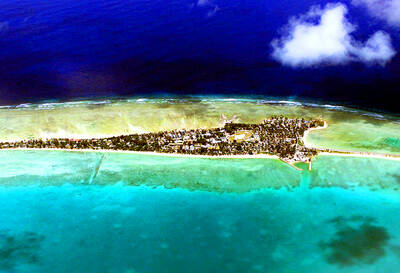One of the few survivors of the Khmer Rouge’s deadliest torture center gave a long-awaited testimony yesterday, weeping as he recounted life at the facility where 16,000 others were tortured before execution.
Vann Nath, 63, escaped execution because he was an artist and took the job of painting and sculpting portraits of the Khmer Rouge’s late leader, Pol Pot. His special status did not spare him misery.
“The conditions were so inhumane and the food was so little,” Vann Nath told the tribunal, tears streaming down his face. “I even thought eating human flesh would be a good meal.”

PHOTO: REUTERS
Vann Nath said he was fed twice a day, each meal consisting of three teaspoons of rice porridge. Prisoners were kept shackled and ordered not to speak or move.
“We were so hungry, we would eat insects that dropped from the ceiling,” Vann Nath said. “We would quickly grab and eat them so we could avoid being seen by the guards.”
“We ate our meals next to dead bodies, and we didn’t care because we were like animals,” he said.
The testimony came at the trial of Kaing Guek Eav — better known as Duch, who headed the S-21 prison in Phnom Penh from 1975 to 1979. Up to 16,000 men, women and children were tortured under his command and later killed. Only about a dozen people, including Vann Nath, are thought to have survived, most of whom have since died. Two other survivors are scheduled to testify this week.
Duch is the first senior Khmer Rouge figure to face trial and the only one to acknowledge responsibility for his actions. Senior leaders Khieu Samphan, Nuon Chea, Ieng Sary and Ieng Sary’s wife, Ieng Thirith, are all detained and likely to face trial in the next year or two.
Duch, 66, sat silently and watched Vann Nath impassively as he spoke. Duch is charged with crimes against humanity and is the first of five defendants scheduled for long-delayed trials by the UN-assisted tribunal.
Duch has previously testified that being sent to S-21 was tantamount to a death sentence and that he was only following orders to save his own life.
Vann Nath said he was arrested on Dec. 30, 1977, at his home in northwestern Battambang Province, where he worked as a rice farmer.
He was accused of trying to overthrow the Khmer Rouge and of being an enemy of the regime. He arrived at S-21 on Jan. 7, 1978, and was kept there until the regime collapsed about one year later.
Vann Nath said he was tortured at a different camp after his arrest, but spared torture at S-21.
The court was shown a dozen paintings Vann Nath made after the fall of the regime that depicted events from S-21, some of which he says he witnessed and some related to him by others. The paintings showed executions, prison guards snatching a baby from a mother and women being tortured by guards who set scorpions loose on their bodies.
The regime’s radical policies caused the deaths of an estimated 1.7 million people by execution, overwork, disease and malnutrition.
Most prisoners were tortured into giving fanciful confessions that suited the Khmer Rouge’s political outlook, though they generally had been loyal members of the group.
“What I want is something that’s intangible,” Vann Nath said. “I want justice for those that died.”

DISASTER: The Bangladesh Meteorological Department recorded a magnitude 5.7 and tremors reached as far as Kolkata, India, more than 300km away from the epicenter A powerful earthquake struck Bangladesh yesterday outside the crowded capital, Dhaka, killing at least five people and injuring about a hundred, the government said. The magnitude 5.5 quake struck at 10:38am near Narsingdi, Bangladesh, about 33km from Dhaka, the US Geological Survey (USGS) said. The earthquake sparked fear and chaos with many in the Muslim-majority nation of 170 million people at home on their day off. AFP reporters in Dhaka said they saw people weeping in the streets while others appeared shocked. Bangladesh Interim Leader Muhammad Yunus expressed his “deep shock and sorrow over the news of casualties in various districts.” At least five people,

ON THE LAM: The Brazilian Supreme Court said that the former president tried to burn his ankle monitor off as part of an attempt to orchestrate his escape from Brazil Former Brazilian president Jair Bolsonaro — under house arrest while he appeals a conviction for a foiled coup attempt — was taken into custody on Saturday after the Brazilian Supreme Court deemed him a high flight risk. The court said the far-right firebrand — who was sentenced to 27 years in prison over a scheme to stop Brazilian President Luiz Inacio Lula da Silva from taking office after the 2022 elections — had attempted to disable his ankle monitor to flee. Supreme Court judge Alexandre de Moraes said Bolsonaro’s detention was a preventive measure as final appeals play out. In a video made

It is one of the world’s most famous unsolved codes whose answer could sell for a fortune — but two US friends say they have already found the secret hidden by Kryptos. The S-shaped copper sculpture has baffled cryptography enthusiasts since its 1990 installation on the grounds of the CIA headquarters in Virginia, with three of its four messages deciphered so far. Yet K4, the final passage, has kept codebreakers scratching their heads. Sculptor Jim Sanborn, 80, has been so overwhelmed by guesses that he started charging US$50 for each response. Sanborn in August announced he would auction the 97-character solution to K4

SHOW OF FORCE: The US has held nine multilateral drills near Guam in the past four months, which Australia said was important to deter coercion in the region Five Chinese research vessels, including ships used for space and missile tracking and underwater mapping, were active in the northwest Pacific last month, as the US stepped up military exercises, data compiled by a Guam-based group shows. Rapid militarization in the northern Pacific gets insufficient attention, the Pacific Center for Island Security said, adding that it makes island populations a potential target in any great-power conflict. “If you look at the number of US and bilateral and multilateral exercises, there is a lot of activity,” Leland Bettis, the director of the group that seeks to flag regional security risks, said in an